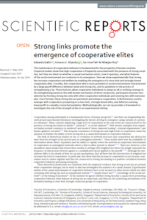The theoretical and experimental literatures on the endogenous emergence of monetary systems have almost exclusively focused on bilateral and temporary trade encounters. Market participants cannot choose with whom and how many individuals to interact in a period. In other words, trade cannot happen on a stable network, but must occur on an unstable network consisting of a sequence of bilateral random meetings. By contrast, the theoretical and experimental literatures on social norms and networks have studied efficiency and cooperation in more general network configurations, but have ignored the role played by financial institutions in improving the economy’s performance.
The central innovation of this project is to leverage the relative strengths of these two separate literatures, in order to study the endogenous emergence of monetary and credit systems in economies arranged as networks. This is a new area of experimental and theoretical research, which has significant potential to shed light on the role of financial institutions because macroeconomies are best seen as networks of interacting agents rather than random two-person trading encounters.
The empirical investigation of how the structure of social interactions interacts with markets and financial institutions is a growing area of inquiry. It has implications for both testing and extending economic theory, and the formulation of policies that account for the importance of social network structure. In particular, the sustenance of cooperative behaviour is essential to enhance efficiency in the many types of economic interactions where it is not possible to implement a formal system of incentives. A focus of this project is the comparison of the efficiency of informal, decentralized arrangements – social networks – and the most basic form of financial institution – a monetary system. It also explores whether the presence of a monetary system complements or substitutes the role of social networks in sustaining cooperative behaviour. The results of the experiments are relevant and closely related to work in other social sciences (e.g. management, political science, sociology) as well as evolutionary biology. The project will involve a future PhD student of mine who has recently been awarded a fully-funded Faculty Studentship for the 2020-2023 period.
Strong Links Promote the Emergence of Cooperative Elites
Strong Links Promote the Emergence of Cooperative Elites, Edoardo Gallo, Yohanes E. Riyanto, Tat-How Teh and Nilanjan Roy, Scientific Reports (Nature), Vol. 9 no. 10857 (2019)
The maintenance of cooperative behavior is fundamental for the prosperity of human societies. Empirical studies show that high cooperation is frequently associated with the presence of strong social ties, but they are silent on whether a causal mechanism exists, how it operates, and what features of the social environment are conducive to its emergence. Here we show experimentally that strong ties increase cooperation and welfare by enabling the emergence of a close-knit and strongly bound cooperative elite. Crucially, this cooperative elite is more prevalent in social environments characterized by a large payoff difference between weak and strong ties, and no gradation in the process of strengthening a tie. These features allow cooperative individuals to adopt an all or nothing strategy to tie strengthening based on the well-known mechanism of direct reciprocity: participants become very selective by forming strong ties only with other cooperative individuals and severing ties with everyone else. Once formed, these strong ties are persistent and enhance cooperation. A dichotomous society emerges with cooperators prospering in a close-knit, strongly bound elite, and defectors earning low payoffs in a weakly connected periphery. Methodologically, our set-up provides a framework to investigate the role of the strength of ties in an experimental setting.


